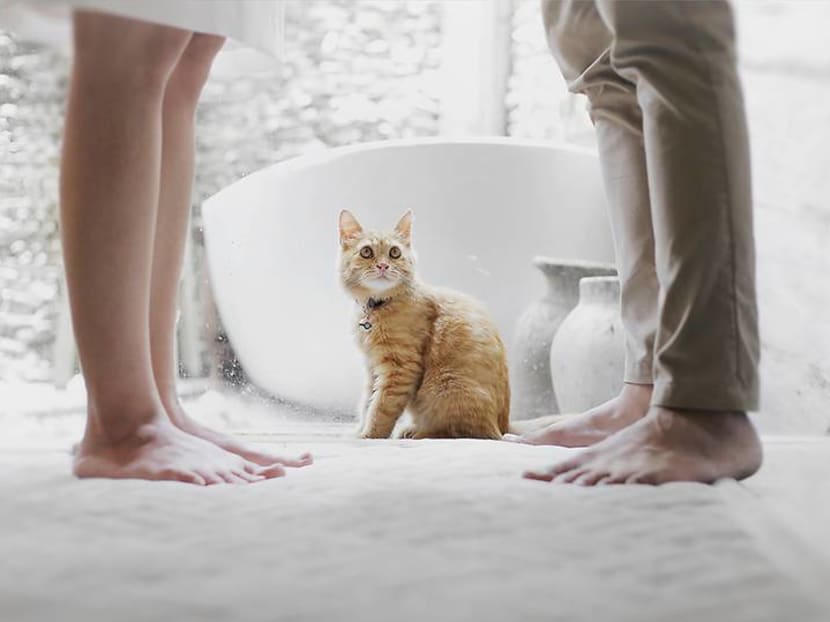Relationships in quarantine: How couples living together can remain happy
Spending time together for extended periods – like during this “circuit breaker” period – can be a recipe for disaster. Giving each other space will help.

For couples staying together, the current situation might seem like the perfect romantic scenario. You’re both working from home and spending even more time with each other – what could possibly go wrong?
Unfortunately, many couples might not have experienced living together for extended periods such as what we’re experiencing right now. Yes, they may live together but as adults there’s time spent apart on weekdays as they (or one of them) goes to work, for instance. Not anymore – and this romantic cabin fever situation might lead to brewing tensions.
We spoke to relationship experts to find out how extended periods together might be problematic, and what couples can do to alleviate it.
THE MENTAL EFFECTS OF COVID-19
The pandemic has had its own effects on the mental well-being of many. The heightened state of fear and anxiety definitely plays a part when it comes to inciting conflict, as people might react negatively and make poor decisions that they would not otherwise, said Dr John Lim, chief well-being officer at the Singapore Counselling Centre.
Problems with communication, struggles over household chores, differences in parenting styles and clashes in values are issues that may surface.
It’s all a cascading effect as stay-at-home measures compound this anxiety and make it difficult to escape, both physically and mentally.
“Problems with communication, struggles over household chores, differences in parenting styles and clashes in values are some issues that may surface during this period of time,” said Dr Lim.
SHARED SPACE VS PERSONAL SPACE
Besides the effects of the outbreak itself, the biggest factor that’s apparent now is the extensive stay-at-home measures, including the current circuit breaker.
People who are quarantined are more vulnerable to developing a range of psychological symptoms, such as irritability, anxiety, low mood, insomnia, anger, depression, said Jolene Hwee, Clinical Director and Psychologist at Clarity Counselling and Consulting.
Besides this, the close-quarter confines of home might also bring couples too close for comfort, physically or otherwise.
Without the privacy, time and opportunity to be alone in his or her personal space, the individual may feel more frustrated
“In relationships, couples have a shared space and personal spaces. With the personal space, this helps the individual to maintain their sense of self and identity and meet their own wants and needs. This is also part of self-care,” said Dr Lim.
“However, with the greater emphasis on staying home to curb the spread of the virus, this can lead to the erosion of each person’s personal space and the shared space grows,” he explained. “Without the privacy, time and opportunity to be alone in his or her personal space, the individual may feel more frustrated as his or her own wants and needs are not met. These negative feelings may be projected on the partner which can lead to conflict.”
Seeing each other every day may also cause differences in values to arise more often, which can lead to arguments.
“For example, the husband might value work more while the wife might value family more. The wife may feel that the husband is not spending enough time with the family despite being home the whole day,” said Dr Lim.
She also highlighted that differences in relationship styles might become more apparent, as differences in expectations of your partner may lead to more friction.
‘NOT THIS AGAIN’
Long-standing and unresolved issues are also likely to come to the fore during this period, another potential cause for fierce arguments.
“For couples who have had long and deep-seated issues regarding trust and communication, and have not actively managed those issues, this time will be challenging. In short, if you have spent your time avoiding or denying problems in your relationship, being quarantined together could potentially be the last straw. All these issues might come to the forefront,” said Hwee.
Dr Lim, agreed, highlighting time spent apart when leaving for work – as many of us used to do – as a positive aspect in dealing with fights.
If you have spent your time avoiding or denying problems in your relationship, being quarantined together could potentially be the last straw.
He said: “Leaving the house for work can act as a reprieve for both to stand down the negative emotions and have great clarity to deal with the issues they are facing. Now without this reprieve, the emotions could be escalated with strong adverse effects on the relationship.”
HOW TO SPOT THE SIGNS
So how do you tell that you’re letting the anxiety get to you?
For one thing, if you feel increased irritability, feeling hot-headed, increased withdrawal and a decline in wanting intimacy with your partner, you might want to take a step back and cool down.
“In a lockdown, our regular routines have all been upended. We are in an evolving crisis that continually makes demands on our ability to adapt, and to adapt well. A lot of us are still in the midst of adjusting to this new normal, and some are grieving over the loss of their regular community and routines,” explained Hwee.
We are in an evolving crisis that continually makes demands on our ability to adapt, and to adapt well.
Recognising that there might be an issue also helps down the line, because knowing that you’re in a heightened state of fear and confusion will let you see that you might be reacting more than you normally would.
Dr Lim said: “This self-awareness would greatly enable the couple to take a step back to recognise the impact that the external environment has on the relationship.”
HOW RESOLVE THE ARGUMENT
Being quarantined together isn’t all doom and gloom, however, and spending more time at home also provide the opposite opportunity – for couples to understand each other better and rekindle the flame.
“Couples with a good foundation of trust and respect will turn towards each other, and thus create a positive feedback loop that benefits the relationships,” said Hwee.
Couples with a good foundation of trust and respect will turn towards each other.
Dr Lim explained the double-edged sword of being quarantined, saying: “Couples who find themselves in mandatory stay-at-home measures could go through great turmoil together or a great time together of personal growth and positive discovery of one another thus yielding a greater bonded relationship.”
TIME TO CREATE NEW (SEPARATE) ROUTINES
So what can couples do to help their relationship blossom during this period? Hwee suggested forming new routines to cope with this period of uncertainty.
She said: “We need to focus on what we can control, and not what we can't. I would encourage couples to create healthy boundaries with each other – respect each other's time and space, try to give the other time for solitude, remember that we are all struggling to adapt, and we all adapt differently.”
Being in isolation with your partner does not mean you have to spend every single minute together.
“Being in isolation with your partner does not mean you have to spend every single minute together. Create new, separate routines for yourself, your partner, and with your children. Some daily and weekly structures are very useful to find your individual rhythm,” she continued.
Dr Lim also shared the same idea, saying: “For example, after work, they can first give each other time and space to unwind before coming together to talk about their day. This gives the couple a good balance of personal and shared space.”
As always, constructive communication is key too, and Dr Lim suggested that couples could use “I” statements instead of “you” accusations as one way to do so.
But of course, spending quality time together at home is still important, and couple’s should still take the time to connect emotionally with each other. Express appreciation for each other too, said Dr Lim.
She added: “The world is going through great uncertainty and each of us are doing the best we can to cope with the situation to the best of our ability. Be it working from home, managing the children’s home-based learning activities and juggling household chores, each of us is learning and adapting as much as we can. Give one another credit for the efforts made and continue to tackle the situation as a team, together.”





